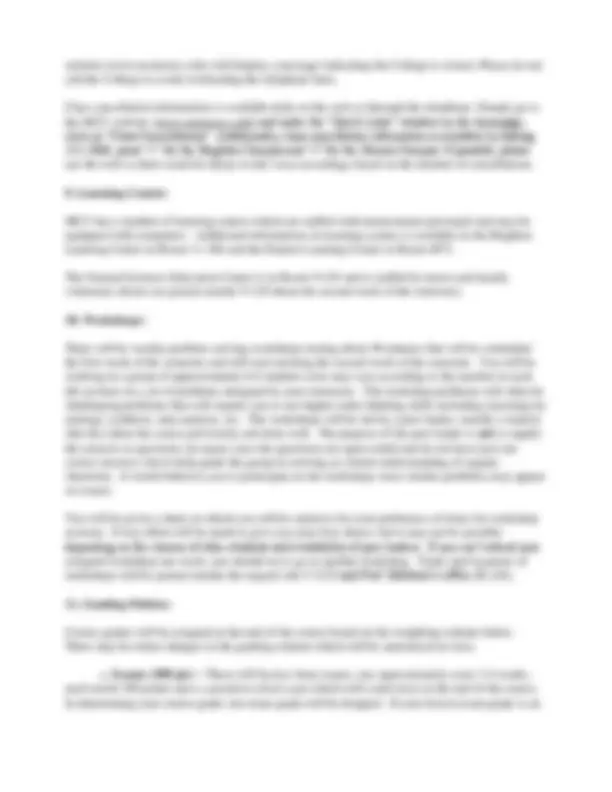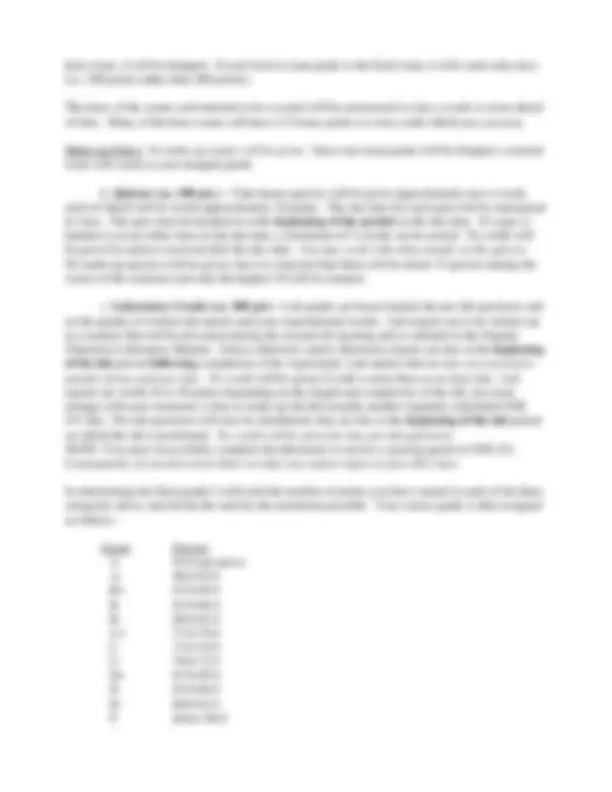




Study with the several resources on Docsity

Earn points by helping other students or get them with a premium plan


Prepare for your exams
Study with the several resources on Docsity

Earn points to download
Earn points by helping other students or get them with a premium plan
Community
Ask the community for help and clear up your study doubts
Discover the best universities in your country according to Docsity users
Free resources
Download our free guides on studying techniques, anxiety management strategies, and thesis advice from Docsity tutors
Material Type: Lab; Professor: Edelbach; Class: Organic Chemistry I-WR; Subject: Chemistry (CHE); University: Monroe Community College; Term: Fall 2008;
Typology: Lab Reports
1 / 4

This page cannot be seen from the preview
Don't miss anything!



Instructor : Brian Edelbach Office: Room 8-238 Phone 292- Electronic mail: bedelbach@monroecc.edu – please feel free to contact me via email if you will miss class or lab. Unless previously arranged, no assignments will be accepted via email.
Office Hours: Mon. 11-12, Tues. 10-11, Wed. 9-10, Wed. 5-6, Fri. 11-12.
I am in my office a great deal of time. Please feel free to come by and see me , I will help you then or arrange another time to meet with you.
Many of the course handouts can be found on the course web site. The course web site can be found at http://web.monroecc.edu/bedelbach/
2. Course Materials: 1. Organic Chemistry (5th^ edition) by Paula Bruice (Prentice Hall) 2. Solutions Manual and Study Guide for Bruice’s text 3. Molecular Model Kit for organic chemistry (recommended) 4. Techniques in Organic Chemistry (2nd^ edition) by Mohrig, Hammond, and Schatz 5. Organic Chemistry Laboratory Manual by B. Edelbach & J. Cullen 6. Approved **safety goggles
CHE 251 is the first semester of a two semester sequence in organic chemistry. The principles of bonding, molecular structure (with an emphasis on the three-dimensional aspects of structure and stereochemistry), polarities and acid-base properties are reviewed in CHE 251. These principles are extended to organic compounds and their reactions. The course concentrates on organic reactions and their mechanisms. The relationship between molecular structure, properties and reactivity is emphasized throughout the course. Topics discussed include classes of organic compounds and nomenclature, thermodynamics and kinetics, addition reactions of alkenes and alkynes, stereochemistry, resonance and electron delocalization, aromaticity, and electrophilic aromatic substitution reactions.
The laboratory introduces the basic separation, purification, reaction and structure determination techniques of organic chemistry on the microscale level. Spectroscopic methods of analysis are emphasized. In CHE 251 ultraviolet/visible, infrared and proton NMR spectroscopy are discussed and used in the laboratory.
4. Course Learning Outcomes:
Upon successful completion of CHE 251 the student will be able to:
Assign IUPAC names to simple alkanes, alkenes, alkynes, alkyl halides, and alcohols. Draw the structure of an alkane, alkene, alkyne, or alkyl halide from an IUPAC name. Demonstrate an understanding of the key principles of atomic and molecular structure, chemical bonding, molecular geometry, confomational analysis, and stereochemistry. Predict reaction products of an organic reaction from given starting materials and reagents. Provide the necessary starting material and/or reagents required to produce a given organic product. Design multistep (3 or 4 steps) synthesis for organic compounds using retrosynthetic analysis. Propose reasonable reaction mechanisms for a given reaction using curved arrow notation. Generate the complete structure of simple unknown organic compounds using UV/Vis, IR and proton NMR spectroscopy. Perform microscale organic reactions and determine product identity, purity and percent yield. Purify products from a chemical reaction using extraction, recrystallization, and sublimation. Write formal lab reports to convey results of experiments in a clear, logical manner.
5. Prerequisites:
The prerequisite for CHE 251 is a grade of C or better in CHE 152 (or the equivalent course at another college). Please see me if you are not sure if you meet the prerequisite.
6. Attendance and Withdrawal Policy
Attendance will be taken at all classes and laboratories. Three or more absences may result in your being withdrawn from the course. Please contact me if you are absent or anticipate being absent for several classes. If you decide to drop the course, please obtain a Student Initiated Course Withdrawal Form from Records and Registration and bring it to me to sign. The withdrawal deadline is approximately four weeks before the end of classes. Please see the MCC Student Handbook and Course Catalog for the exact dates and additional information on academic regulations at MCC.
7. Academic Honesty
Written work (exams, lab reports and quizzes) turned in should be entirely your own work unless specified otherwise. You should cite material taken from other sources used in writing your lab reports. Instances of plagiarism or cheating will be dealt with as directed by the MCC Code of Conduct as indicated in the MCC Student Handbook and Course Catalog
8. Emergency Closings and Class Cancellation
All Rochester area radio and television stations will be notified no later than 5:30 a.m if the College is closed due to an emergency or inclement weather. In addition, the homepage on the MCC
hour exam, it will be dropped. If your lowest exam grade is the final exam, it will count only once (i.e. 100 points rather than 200 points).
The dates of the exams and material to be covered will be announced in class a week or more ahead of time. Many of the hour exams will have 2-5 bonus points or extra credit which you can earn.
Make-up Policy: No make-up exams will be given. Since one exam grade will be dropped, a missed exam will count as your dropped grade.
b. Quizzes (ca. 100 pts.) – Take-home quizzes will be given approximately once a week, each of which will be worth approximately 10 points. The due date for each quiz will be announced in class. The quiz must be handed in at the beginning of the period on the due date. If a quiz is handed in at any other time on the due date, a maximum of ½ credit can be earned. No credit will be given for quizzes received after the due date. You may work with other people on the quizzes. No make-up quizzes will be given, but it is expected that there will be about 13 quizzes during the course of the semester and only the highest 10 will be counted.
c. Laboratory Grade (ca. 200 pts) – Lab grades are based mainly the pre-lab questions and on the quality of written lab reports and your experimental results. Lab reports are to be written up in a manner that will be discussed during the second lab meeting and is outlined in the Organic Chemistry Laboratory Manual. Unless otherwise stated, laboratory reports are due at the beginning of the lab period following completion of the experiment. Lab reports that are late are assessed a penalty of one point per day. No credit will be given if a lab is more than seven days late. Lab reports are worth 10 to 30 points depending on the length and complexity of the lab, you must arrange with your instructor a time to make up the lab (usually another regularly scheduled CHE 251 lab). Pre-lab questions will also be distributed; they are due at the beginning of the lab period on which the lab is performed_. No credit will be given for late pre-lab questions_. NOTE: You must successfully complete the laboratory to receive a passing grade in CHE 251. Consequently, if you miss more than two labs you cannot expect to pass this class.
In determining the final grades I will total the number of points you have earned in each of the three categories above and divide the total by the maximum possible. Your course grade is then assigned as follows:
Grade Percent A 93.0 and above A- 90.0-92. B+ 87.0-89. B 83.0-86. B- 80.0-82. C+ 77.0-79. C 73.0-76. C- 70.0-72. D+ 67.0-69. D 63.0-66. D- 60.0-62. F below 60.